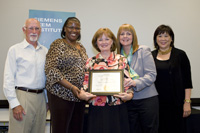Editorial
Front Page - Friday, September 3, 2010
Dizer encourages students to build early foundations in STEM fields
Erica Tuggle
 Linda Dizer is a biology teacher and the head of the science department at the Girls Preparatory School in downtown Chattanooga. This summer, she spent an intensive week at the Seimens STEM institute to enhance her skills of preparing her students for exposure to and interest in careers in science, technology, engineering and mathematics. She is pictured here with other participants of the institute holding a certificate of participation for the STEM Academy.
- Photo provided
Linda Dizer is a biology teacher and the head of the science department at the Girls Preparatory School in downtown Chattanooga. This summer, she spent an intensive week at the Seimens STEM institute to enhance her skills of preparing her students for exposure to and interest in careers in science, technology, engineering and mathematics. She is pictured here with other participants of the institute holding a certificate of participation for the STEM Academy.
- Photo provided
In the not so distant past, little girls were told they could be anything they wanted to be when they grew up … as long as they became a teacher, a nurse or a secretary. These days, girls have unlimited options to pursue any career field of their choice, and so biology teacher and science department head Linda Dizer of Girls Preparatory School is saying, why not consider a STEM career?
Careers in science, technology, engineering and mathematics all fall under the category of STEM, and these are the careers that the U.S. is hurting for, Dizer says. GPS graduates about 30 percent of students who declare a STEM major entering college. This is significantly above the national average and they want that to continue and grow, she says.
“As a woman, I would like to see our girls offered more than teacher, nurse or secretary positions,” she says. “There is a world of unbelievable jobs that women can do and we are quite qualified to do. We need to challenge them in high school and give them the foundation so they get into college and say, ‘I can do this.’”
Dizer’s devotion to making these ideas a reality could be part of the reason she was chosen out of 600 nationwide entries to be one of the 50 teachers who attended the Seimens STEM Academy program at
the Discovery Education headquarters during the first week
of August.
Dizer says she thinks it is especially important for GPS to be involved in these types of programs because women are underrepresented in STEM fields.
At the STEM Academy, Dizer got to spread around her love of biology with 49 other high-powered teachers from all types of different STEM fields in an atmosphere she says was “electric.” One of the high points in her trip was hearing Dr. Alan Leshner, the former head of the National Institute of Drug Abuse, speak.
The group also toured the White House conference center, listened and spoke to Dr. John Holdren, the director of the White House Office of Science and Technology Policy, visited museums and heard many other speakers. Dizer was able to visit the National Institute of Health and listen to a doctor’s speech on cancer related illnesses caused by taking HIV treatment drugs during pregnancy.
In the latter part of the week, the group formed teams and began to work together to incorporate the technology and skills they had learned into their chosen topics to share with their classes upon returning. Dizer was paired with a teacher from New Jersey and a teacher from North Carolina to collaborate on their forensic classes.
Dizer says after her GPS forensics class has learned the basics, they are going to develop a crime, generate scenarios, evidence and witness and suspects interviews, and then use technology to share the information and evidence with the classes in New Jersey and North Carolina.
The biggest issue the groups face in this type of communication is school districts that lie across different time zones, Dizer says. When she received the Toshiba grant for marine science last year to breed Banggai Cardinal fish, the Japanese classroom that her students worked with had difficulties finding time other than after or before school hours to connect with these classes. Luckily, Dizer says, the Web based technology of new programs allows these issues to be resolved by connecting without time sensitivity.
“We are using technology for communication purposes and to show off what [students] do. In science, you can do all kinds of research, but if you can’t present it in a way that people can see what you are doing, then it is for naught.”
Besides visiting her daughter, son-in-law and two grandchildren in Knoxville, Dizer enjoys snorkeling and collecting sand from places she visits to view and photograph under her microscope.
“A lot of what I love to do is what I do here at work,” she says.
From the time that Dizer’s older sister brought home her high school biology book and Dizer looked inside, she knew biology was what she wanted to do. She was the first in her family to receive a college degree, she says, for the simple reason that they wouldn’t let her teach biology without it. She went on to receive her master’s degree in teaching biology and is now in her 17th year at GPS.
“I love teaching biology,” she says. “I love seeing kids get excited about a world they didn’t even know existed, or they think about things they have not thought about in that way.”
Encouraging all students of both genders to enter STEM fields is something she will also continue to do, showing students that the options in STEM careers go beyond the realm of teaching.
|
|